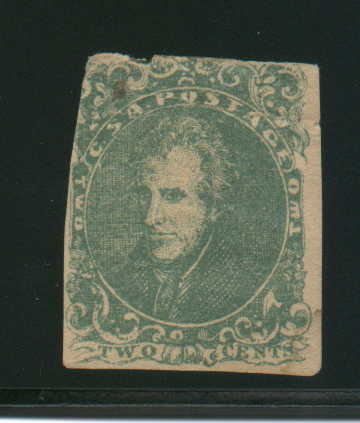

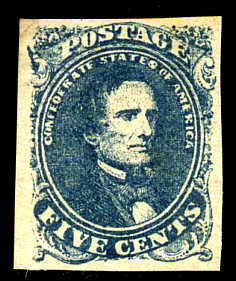
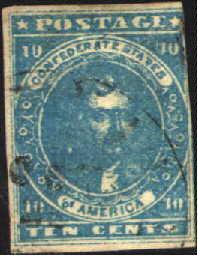
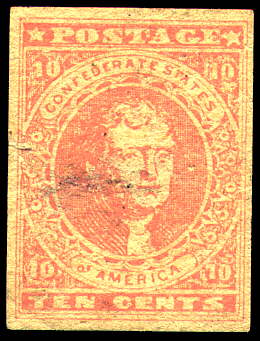
Return To Catalogue - Confederate States locals Athens - Greenville - locals Greenwood - Marion - locals Memphis - Nashville - locals New Orleans - Victoria and miscellaneous - Confederate Bogus Locals - United States
Note: on my website many of the
pictures can not be seen! They are of course present in the cd's;
contact me if you want to purchase them: evert@klaseboer.com.
In 1861 eleven southern states of the USA declared themselves independant (Alabama, Arkansas, North Carolina, South Carolina, Florida, Georgia, Louisiana, Missisippi, Texas, Tennessee and Virginia). Shortly after the American civil war started. In 1865 the eleven states re-joined the USA again. During this period stamps for the Confederate States were issued; a general issue and many local issues.
2 c green (Andrew Jackson) 5 c green (Jefferson Davis) 5 c blue (Jefferson Davis) 10 c blue (Thomas Jefferson) 10 c red (Thomas Jefferson)
Value of the stamps |
|||
vc = very common c = common * = not so common ** = uncommon |
*** = very uncommon R = rare RR = very rare RRR = extremely rare |
||
| Value | Unused | Used | Remarks |
| 2 c | RR | RRR | |
| 5 c green | RR | RR | |
| 5 c blue | RR | RR | |
| 10 c blue | RR | RR | |
| 10 c red | RRR | RRR | |
2 c red (Jackson) 5 c blue (Davis) 10 (Ten) c blue (Davis) 10 c blue (Davis) 20 c green (Washington)
Value of the stamps |
|||
vc = very common c = common * = not so common ** = uncommon |
*** = very uncommon R = rare RR = very rare RRR = extremely rare |
||
| Value | Unused | Used | Remarks |
| 2 c | *** | RRR | |
| 5 c | ** | *** | |
| 10 (Ten) | RRR | RRR | |
| 10 c | ** | *** | |
| 20 c | *** | RRR | |
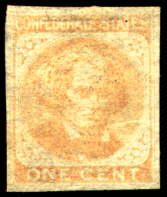

1 c orange (Calhoun) 10 c blue (Davis)
Value of the stamps |
|||
vc = very common c = common * = not so common ** = uncommon |
*** = very uncommon R = rare RR = very rare RRR = extremely rare |
||
| Value | Unused | Used | Remarks |
| 1 c | R | Does not exist | |
| 10 c | ** | Does not exist | |
Besides some very poor forgeries, hardly resembling the originals, some better ones also exist. Be carefull with cancelled stamps, many forged cancellations on genuine stamps exist!
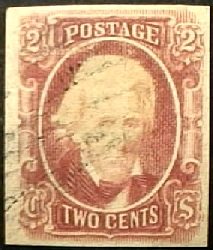
(Forged cancel on a genuine stamp)
Information on forgeries and bogus issues can be found on http://www.rfrajola.com/csa/csaindex.htm or at http://members.home.com/kr.baker/csa/fakes/ (Kevin Baker) or at http://www.jlkstamps.com/webpage/index1.htm
Large sized forgeries (about twice the size of the genuine stamps), or 'Facsimile die proofs' as they were offered were made in 1919 by A.Dietz. These were later used (in the right size) to make 'Springfield' forgeries.
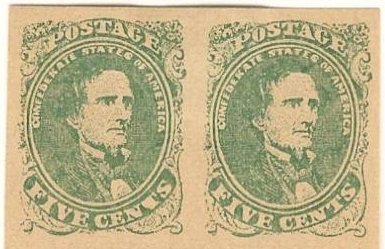
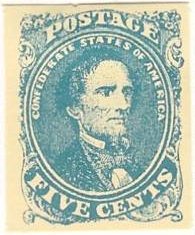
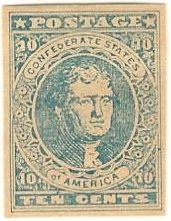
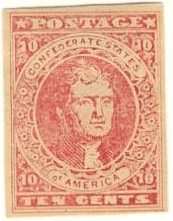
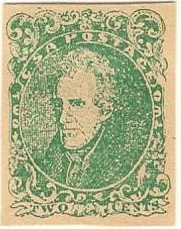
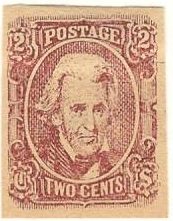
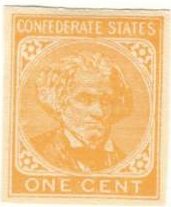
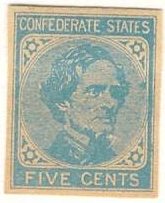
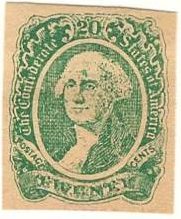
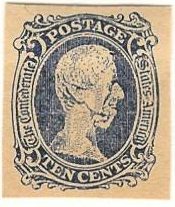
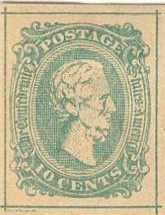
(Inscription 'Curtis Collection' at lower left of design)

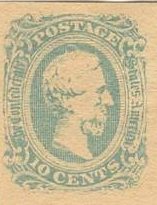
(Die A and die B)
These forgeries are printed on yellowish paper and seem to have a mottled appearance. Produced about 1934 by Tatham's Stamp Company of Springfield, Mass, USA and by H.E. Macintosh, the owner of the company. The Springfield forgeries are the most common forgeries. The paper is different from the genuine issues. Many of these forgeries have the overprint 'Facsimile' on the back (due to complaints), but the first issues don't have this overprint. It seems that the first issues also exist cancelled (but I've never seen them). A short review of these stamps can be found in 'Philatelic forgers, their lives and works' by V.E.Tyler, 1976. There is also an image of an educational booklet with the stamps mounted in it, distributed by the Tatham Stamp & Coin Company (Tasco). These forgeries were offered indiviual, cancelled or uncancelled, in blocks or even full sheets. They were still offered in the 1950's. Springfield forgeries are frequently found in many collections and often offered in whole series on popular Internet auctions.
I found the following information on http://jlkstamps.com/fakes/fakecsa.htm, concerning the distinguishing characteristics of these Springfield forgeries:





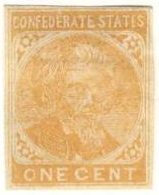
(Calhoun has a beard in this forgery!)

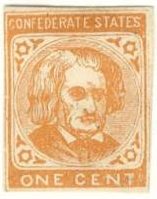
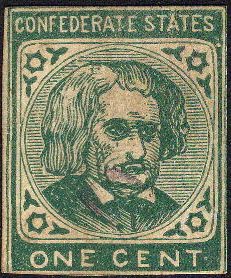
(Left cut from a Scott album of 1886, middle and right forgeries
based on this cut)
Forgeries similar to the image of a Scott stamp album of 1886 were used to produced forgeries.
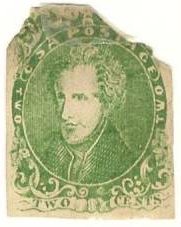
The above forgery has no periods behind the letters 'C', 'S' and 'A' in 'C.S.A.'.
Forgeries made from cuts of a Scott album:
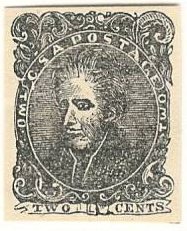

(Left cut from a Scott album, right
forgery based on this cut)
The banner below 'TWO CENTS' is almost straight in these forgeries. I have also seen this forgery in the colour red. The nose is very thin and pointed, there are no dots behind 'C', 'S' and 'A'. The 'P' of 'POSTAGE' resembles a 'D' and the 'G' of this word is very strange. This is the forgery described in Album Weeds.

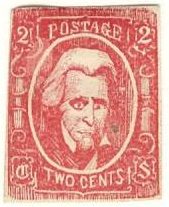
(Cut from a Scott album of 1886 and
stamps based on this cut)
Sperati forgery (forged cancel on genuine stamp):

(Forged Sperati cancel 'PAID NEW YORK JUL 12' in red on genuine
stamp)
For more information on Sperati forgeries, see under the forgeries of the 10 c Thomas Jefferson (1861) stamp.
So-called Birmingham forgeries:


(Birmingham forgery and scroll at right hand bottom of a red
stamp)
The scroll at the right hand bottom is made in a circular shape instead of an oval in the genuine stamps. I have also seen this forgery in the colours green, red and black. The Birmingham forgeries are not very common. I think this is the first forgery described in Album Weeds. The collar on the right side of the stamp seems to be part of the beard in this forgery.
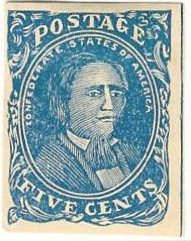
In the above forgery the background is solid and the top of the stamp is almost straight, not at all as in the genuine stamps. I have seen this particular forgery in the colours green and blue in different shades from light to dark.

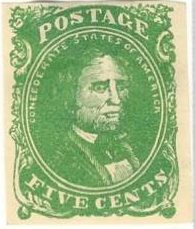

(Cut from a Scott album of 1888 and stamps based on this cut)
Forgeries similar to the image of a Scott stamp album of 1888 were used to produced forgeries, they can be recognized by the solid background and the chin is different from the genuine stamps. The printing stones of the catalogue might have fallen into private hands. Later forgeries have a defective lower right corner (last image above). I've also seen this forgery in blue, red and orange.
Upham forgeries:
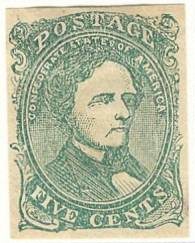
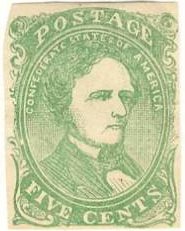
In the forgeries made by S.C.Upham, the background consists of square dots. On early prints, the cheek has some shading on it (see first image above). They were produced in sheets of six (see below) and I've seen the colours light green, dark green, blue, orange and red.
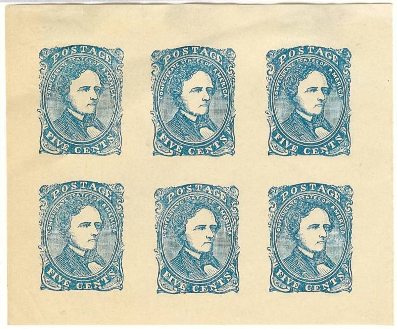
(Upham sheet, reduced size)
Other forgeries:
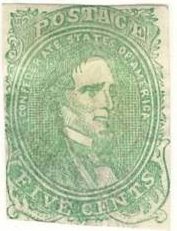
The above forgery has a background of square dots and there is shading on the side of the nose.
Some other very primitive forgeries:
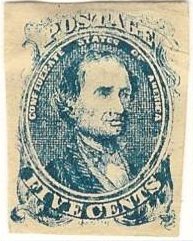
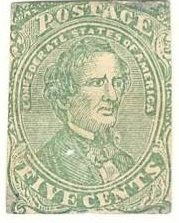
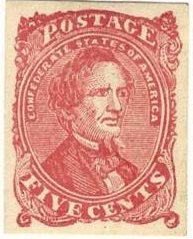
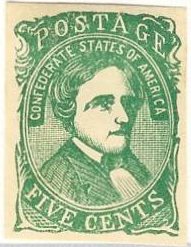
(Note that the word 'POSTAGE' is written in very thin letters)
Some very primitive forgeries of this stamp:
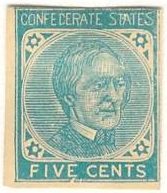

Some slightly better forgeries
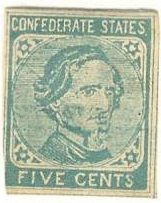
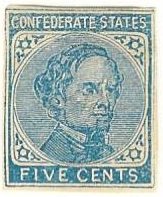
(left: white cheekbone, right: single heavy line of shading below
eye)
Scott (the same from the catalogue!) made forgeries of the 5 c Jefferson Davis stamp. It was made from pieces of the original plate and therefore looks very deceptive. The value part had been redrawn (since Scott got the printing plates of an unissued 10 c in which he removed the value label and put back another 'FIVE CENTS' label). These forgeries are quite common. The Dietz handbook says that the distinguishing characteristics of this forgery are: 'the outer framing line (of the forgery) is three times as thick as that on the genuine stamps; and, the center bars of the 'F' and 'E' of 'FIVE' (in the redrawn portion) are noticeably shorter than in the originals'. Even perforate specimens exist of this forgery. This forgery is also known as the 'New York' forgery. This forgery is also mentioned in 'Album Weeds' as the second forgery, it has been printed probably somewhere around 1900.
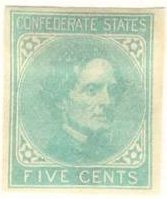
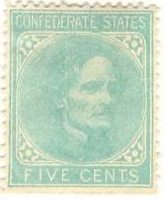
(Scott forgeries)
![]()
(Distinghuishing characteristics of the Scott forgery)
Bogus issues of 10 c in the 5 c Jefferson Davis design exist in a variety of colours (sorry, no picture available yet). I have seen the colours red, orange on yellow, yellow, blue, blue on red, black, violet on yellow, violet etc.
Upham forgery:

(Upham forgery)
In the Upham forgeries, the face is very crudely made, the background consists of horizontal lines and there is a small dash to the right of 'OF'. I have also seen this forgery in the colours red and violet.

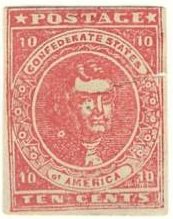
The left lower '10' is very pointed in the above forgeries.

(Very crude face, 'TEN CENTS' in different lettering than
genuine; the 'T' of 'CONFEDERATE' is placed left to the 'T' of
'POSTAGE', it should be at the right)
Forgeries based on the image of the Scott catalogue:

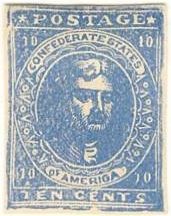

(Left a cut from the Scott catalogue, middle and right forgeries
based on this cut)
I've also seen this forgery in the colour red.
Other primitive forgery:

(This forgery has horizontal background lines)
Sperati forgery:

(Sperati forgery, reduced size)
This Sperati forgery is quite rare. The distinguishing characteristics are:
Sperati has also forged cancels. Some of them are even applied to genuine stamps (and on his forgeries of course). The most famous is a New York City PAID 12 ship marking on a 2 c Andrew Jackson stamp. Other postmarks that he was known to have forged are Charleston SC; Chattanooga, Tenn (Aug 8, 1863); Cincinnati, O; New Orleans, La / 2 (partial strike); and Richmond, Va (July 9, 1863 and May 10, 1865). Sperati forgeries are quite valuable, however, his cancel forgeries are not very valuable. More information can be found at: http://www.jlkstamps.com/fakes/fakecsa.htm.

(Forged Sperati cancel 'PAID NEW YORK JUL 12' in red on genuine
stamp)
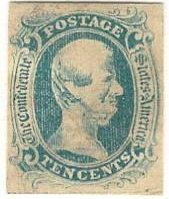
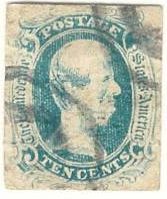
The above forgery is very crude.
I know of a Senf forgery, with on the backside the inscription 'Facsimile No. 10'. This forgery was given free with the stamp magazin: 'Das Illustriertes Briefmarken-Journal' (about 1880-90).
Sperati forgery:
Sperati forgeries are extremely dangerous. Most of them are signed on the back with the Sperati signature (but not all). There are a number of minor distinguishing marks, the easiest test is the 'T' and 'E' of 'TEN'; they are joined at the top (they are separate in the genuine stamp). Also, there is a white dot to the right of the 'E' of 'POSTAGE'. Sperati seems to have made two reproductions, A and B; they are the same except that in A there is a colourless dot in the scroll between 'CONFEDERATE' and 'POSTAGE', in B this dot in the scroll has been connected. For Sperati postmarks, see under the 10 c Thomas Jefferson.
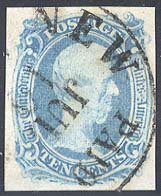
(Sperati forgery with cancel, reduced size)
A very primitive forgery based on a picture in a Scott Album:
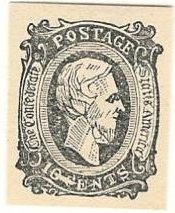

(Left cut from a Scott album, right forgery based on this cut)
A crude forgery made by Upham:
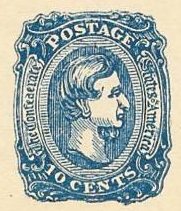
(Upham forgery)
The above forgery was made from a 1886 Scott album cut.
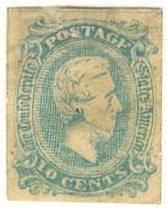
The above forgery is lithographed, there is a thin frame line at the top, the 'O' of 'POSTAGE' is too high and not on the curved line. I think this is the forgery described in 'Album Weeds', the word 'CENTS' is badly done compared to the genuine stamps.
A forgery based on a cut from a Scott catalogue:
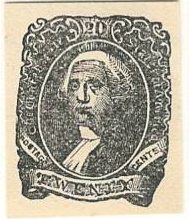
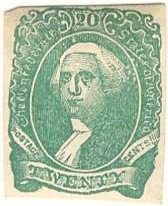
(Left: cut from a Scott catalouge, right forgery based on this
cut)
This must be the forgery described in 'Album Weeds'; the nose is very badly drawn, the mouth is not straight, and the words 'Confederate States of America' are very difficult to distinguish.
Fantasy (or bogus) issues:
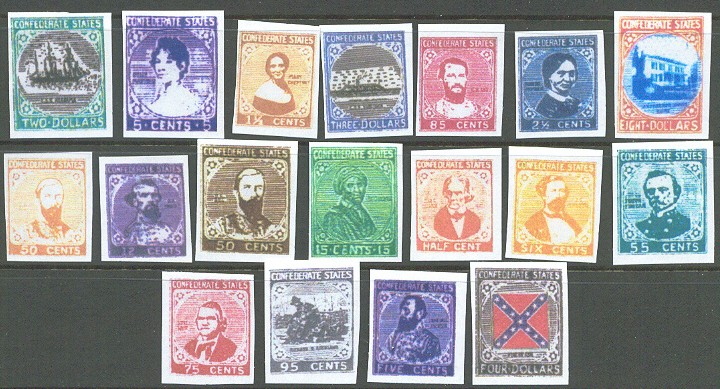
(Some modern(?) fantasy designs, reduced sizes)
Many more bogus stamps in similar designs seem to exist. More information about these 'worthless labels' can be found at: http://www.jlkstamps.com/fakes/fantasy.htm.